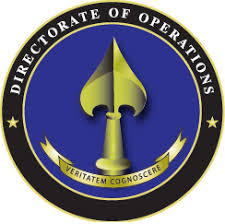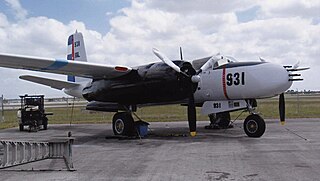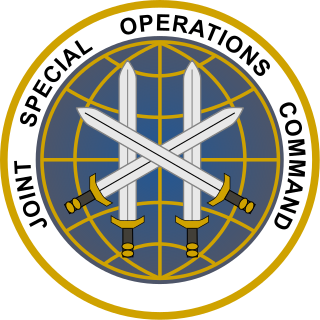Related Research Articles

The Defense Intelligence Agency (DIA) is an intelligence agency of the United States federal government, specializing in defense and military intelligence.

Operation Northwoods was a proposed false flag operation against American citizens that originated within the US Department of Defense of the United States government in 1962. The proposals called for the CIA operatives to both stage and actually commit acts of terrorism against American military and civilian targets, blaming them on the Cuban government, and using it to justify a war against Cuba. The possibilities detailed in the document included the possible assassination of Cuban immigrants, sinking boats of Cuban refugees on the high seas, hijacking planes to be shot down or given the appearance of being shot down, blowing up a U.S. ship, and orchestrating violent terrorism in U.S. cities. The proposals were rejected by President John F. Kennedy.
The Office of Special Plans (OSP), which existed from September 2002 to June 2003, was a Pentagon unit created by Paul Wolfowitz and Douglas Feith, and headed by Feith, as charged by then–United States Secretary of Defense Donald Rumsfeld, to supply senior George W. Bush administration officials with raw intelligence pertaining to Iraq. A similar unit, called the Iranian Directorate, was created several years later, in 2006, to deal with intelligence on Iran.
A covert operation is a military operation intended to conceal the identity of the party that instigated the operation. Covert operations should not be confused with clandestine operations, which are performed in secret and meant to stay secret.

The Special Activities Center (SAC) is a division of the Central Intelligence Agency responsible for covert operations and paramilitary operations. The unit was named Special Activities Division (SAD) prior to 2016. Within SAC there are two separate groups: SAC/SOG for tactical paramilitary operations and SAC/PAG for covert political action.

A black operation or black op is a covert or clandestine operation by a government agency, a military unit or a paramilitary organization; it can include activities by private companies or groups. Key features of a black operation are that it is secret and it is not attributable to the organization carrying it out. Such secrecy is often needed for deniability, due to the sometimes illegal or unethical nature of such operations.
Operation Gladio is the codename for clandestine "stay-behind" operations of armed resistance that were organized by the Western Union (WU), and subsequently by NATO and the CIA, in collaboration with several European intelligence agencies. The operation was designed for a potential Warsaw Pact invasion and conquest of Europe. Although Gladio specifically refers to the Italian branch of the NATO stay-behind organizations, "Operation Gladio" is used as an informal name for all of them. Stay-behind operations were prepared in many NATO member countries, and some neutral countries.
Blowback is a term originating from within the Central Intelligence Agency, explaining the unintended consequence and unwanted side-effects of a covert operation. To the civilians suffering the blowback of covert operations, the effect typically manifests itself as "random" acts of political violence without a discernible, direct cause; because the public—in whose name the intelligence agency acted—are unaware of the effected secret attacks that provoked revenge (counter-attack) against them.
The Strategic Support Branch (SSB) was a United States intelligence organization created by the Department of Defense (DoD) with support from the Defense Intelligence Agency (DIA) and the Central Intelligence Agency (CIA). The SSB's mission was to provide an intelligence capability for field operation units, and U.S. Special Operations Forces (SOF), in support of anti-terrorism and counter-terrorism missions in war zones and beyond. The SSB has been dissolved with many of its activities and capabilities transferred to DIA's Defense Clandestine Service.

The Cuban Project, also known as Operation Mongoose, was an extensive campaign of terrorist attacks against civilians, and covert operations, carried out by the U.S. Central Intelligence Agency in Cuba. It was officially authorized on November 30, 1961 by American President John F. Kennedy. The name Operation Mongoose had been agreed at a prior White House meeting on November 4, 1961. The operation was run out of JM/WAVE, a major secret United States covert operations and intelligence gathering station established a year earlier in Miami, Florida, and led by United States Air Force General Edward Lansdale on the military side and William King Harvey at the CIA and went into effect after the failed Bay of Pigs Invasion.

The Joint Special Operations Command (JSOC) is a joint component command of the United States Special Operations Command (USSOCOM) and is charged to study special operations requirements and techniques to ensure interoperability and equipment standardization; to plan and conduct special operations exercises and training; to develop joint special operations tactics; and to execute special operations missions worldwide. It was established in 1980 on recommendation of Colonel Charlie Beckwith, in the aftermath of the failure of Operation Eagle Claw. It is located at Pope Field.

The Directorate of Operations (DO), less formally called the Clandestine Service, is one of the smallest components of the US Central Intelligence Agency. It was known as the Directorate of Plans from 1951 to 1973; as the Directorate of Operations from 1973 to 2005; and as the National Clandestine Service (NCS) from 2005 to 2015.

The Central Intelligence Agency, known informally as the Agency and the Company, is a civilian foreign intelligence service of the federal government of the United States, officially tasked with gathering, processing, and analyzing national security information from around the world, primarily through the use of human intelligence (HUMINT) and performing covert actions. As a principal member of the United States Intelligence Community (IC), the CIA reports to the Director of National Intelligence and is primarily focused on providing intelligence for the President and Cabinet of the United States.

Michael George Vickers is an American defense official who served as the Under Secretary of Defense for Intelligence (USD-I). As USD-I, Vickers, who was appointed by President Barack Obama in 2010, was the Defense Department's top civilian military intelligence official. Before becoming USD-I, Vickers served as Assistant Secretary of Defense for Special Operations and Low Intensity Conflict.
National governments deal in both intelligence and military special operations functions that either should be completely secret, or simply cannot be linked to the sponsor. It is a continuing and unsolved question for governments whether clandestine intelligence collection and covert action should be under the same agency. The arguments for doing so include having centralized functions for monitoring covert action and clandestine HUMINT and making sure they do not conflict, as well as avoiding duplication in common services such as cover identity support, counterespionage, and secret communications. The arguments against doing so suggest that the management of the two activities takes a quite different mindset and skills, in part because clandestine collection almost always is on a slower timeline than covert action.

After the Central Intelligence Agency lost its role as the coordinator of the entire Intelligence Community (IC), special coordinating structures were created by each president to fit his administrative style and the perceived level of threat from terrorists during his term.
Proactive cyber defence means acting in anticipation to oppose an attack through cyber and cognitive domains. Proactive cyber defence can be understood as options between offensive and defensive measures. It includes interdicting, disrupting or deterring an attack or a threat's preparation to attack, either pre-emptively or in self-defence. Common methods include cyber deception, attribution, threat hunting and adversarial pursuit. The mission of the pre-emptive and proactive operations is to conduct aggressive interception and disruption activities against an adversary using: psychological operations, managed information dissemination, precision targeting, information warfare operations, computer network exploitation, and other active threat reduction measures. The proactive defense strategy is meant to improve information collection by stimulating reactions of the threat agents and to provide strike options as well as to enhance operational preparation of the real or virtual battlespace. Proactive cyber defence can be a measure for detecting and obtaining information before a cyber attack, or it can also be impending cyber operation and be determining the origin of an operation that involves launching a pre-emptive, preventive, or cyber counter-operation.

The CIA publishes organizational charts of its agency. Here are a few examples.

Operation Dark Heart: Spycraft and Special Ops on the Frontlines of Afghanistan and the Path to Victory is a 2010 memoir by retired United States Army Reserve intelligence officer Lt. Col. Anthony Shaffer. The book details Shaffer's five months in Afghanistan in 2003 as a civilian Defense Intelligence Agency officer. Before redactions, the book contained names of intelligence officers and described clandestine operations, including "N.S.A.'s voice surveillance system." The United States Department of Defense went to extreme lengths in an attempt to censor information in the book after it had already been printed.
The United States has at various times in recent history provided support to terrorist and paramilitary organizations around the world. It has also provided assistance to numerous authoritarian regimes that have used state terrorism as a tool of repression.
References
- ↑ Defense Science Board, "DSB Summer Study on Special Operations and Joint Forces in Support of Countering Terrorism," U.S. Department of Defense, Final Outbrief, August 16, 2002; 78 pages (in PowerPoint format). Text of the document in HTML format. This is the publicly published U.S. government document which proposes P2OG.
- 1 2 William M. Arkin, "The Secret War: Frustrated by intelligence failures, the Defense Department is dramatically expanding its 'black world' of covert operations," Los Angeles Times, October 27, 2002. Also available here Archived 2007-04-08 at the Wayback Machine .
- ↑ David Isenberg, "'P2OG' allows Pentagon to fight dirty," Asia Times, November 5, 2002.